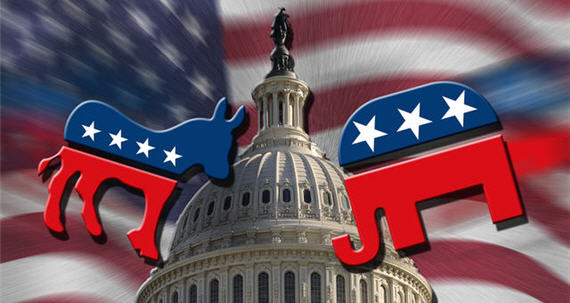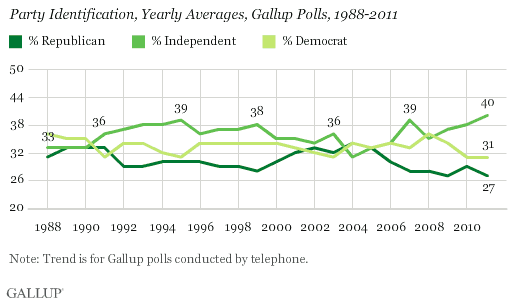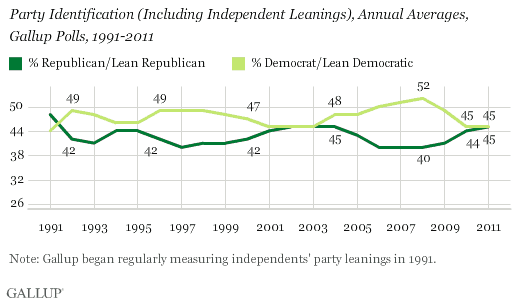40 Percent of Americans Identify as Independents; 10 Percent Actually Independents
A record number of Americans don't consider themselves a member of either party.
A new Gallup poll proclaims “Record-High 40% of Americans Identify as Independents in ’11.”
The percentage of Americans identifying as political independents increased in 2011, as is common in a non-election year, although the 40% who did so is the highest Gallup has measured, by one percentage point. More Americans continue to identify as Democrats than as Republicans, 31% to 27%.
Now, this trend is interesting: Not only do more Americans identify as Independents than at any time since Gallup started asking the question in 1951, but more Americans now identify as Independents than as members of either of the two political parties that have run the country since 1861.
But what does this mean, exactly?
It’s reasonable to conclude that, as both parties have effectively become ideological/programmatic parties rather than the centrist catch-all parties that they had been historically, they no longer do a good job of representing those of us in the broad center. Additionally, for that reason and others, Americans are likely simply more comfortable thinking of themselves as free agents rather than duty bound to identify themselves with a party.
At the same time, however, “Independent” has no effective meaning at the ballot box. While a large swatch of people–myself included–are likely to be unhappy with voting for either Barack Obama or the eventual Republican nominee (probably Mitt Romney) come election day, those will likely be the only meaningful options on the ballot.
Yes, there are various “third” parties out there. The Libertarians, Greens, Constitution Party, Reform Party, Socialist Party, and others will be on the ballot in many states. But none of these parties have benefited from the trend in “Independent” identification because the fact of being enthusiastic about neither the Republicans nor Democrats doesn’t translate into being enthusiastic about some fringe party.
A new centrist group calling itself Americans Elect will also field a candidate this cycle and may even be able have enough money to entice a credible politician to be its standard bearer and run substantial television advertising. Maybe they’ll even siphon off some votes from the major party candidates this year. In states that are non-competitive in the Electoral College, especially, there may be a strategic rationale for casting such a protest vote.
Beyond that, though, while many of us are increasingly disenchanted with the party for whom we’ve traditionally voted, there’s a strong inertia pulling us to support their candidate for president, anyway. For those of us in competitive states, our only real choices are Obama and his Republican opponent; not voting or casting a protest vote is, in effect, a vote for our least favorite of the two viable candidates.
Gallup acknowledges this in their write-up:
[W]hen independents’ party leanings are taken into account and combined with the party’s core identifiers, the parties end up tied. In 2011, 45% of Americans identified as Republicans or leaned to the Republican Party and 45% identified as Democrats or leaned Democratic.
In essence, the true number of “independents” isn’t the 40 percent who identify themselves as such but the 10 percent who don’t lean toward either party. The other 90 percent of likely voters are in the orbit of one party and have to be siphoned off; that’s much harder.
That’s not to say it can’t be done. While I’m increasingly moving from being a strong Republican to a mere leaner, I can’t at this juncture imagine voting for Newt Gingrich or Rick Santorum. Whether I could make the move in one cycle to voting for Obama or instead stayed home or cast a protest vote for a third party candidate, I can’t say.
Thankfully, I don’t think I’ll be forced into that position, since Romney is easily the most likely nominee.




Well there are two kinds of independents, the independents who always vote Republican and the independents who always vote Democratic.
The great thing about Americans Elect is that it gives you the choice to vote for the candidate that you want. I live in Texas, so by the time the Republican nominee is chosen, I will have had no say in the matter. I love the alternative process that Americans Elect gives to voters, especially those voters in states with caucuses that are hardly taken into consideration. Maybe the leaners you mention here may find refuge in this new process.
I’ve gone the other way. I used to be independent, now I’m a Democrat. Under current circumstances, I can’t conceive of voting for any Republican at any level.
The “lean” argument continues to be pure BS.
Jeebus, anyone can define “lean” any way and win without foundation.
I bet I could find a way for you to “lean” Democrat, James. It’s not that hard …. you think the tax cuts should expire, right? Ta-Da!
(Seriously, the point of small-i independence is that you can share ideas with either side, without buying their bundle. You can, for instance, be for prolonging those tax cuts, without implicitly backing creationism, or denying global warming, or hating on teh gays.)
@john personna: But you can do that while being a more-or-less reliable Republican or Democrat, too. And, theoretically at least, have more impact by participating in candidate selection.
The point of the “lean” thing isn’t classification for ideological purposes; rather, it’s prediction for voting purposes. Functionally, an “independent” who always votes for the candidate of a given party is no different from a member of the party on Election Day. You may think of yourself as an “independent” but if you’ve voted for Gore, Kerry, and Obama the last three cycles and will vote for Obama over any Republican this cycle, you’re functionally a Democrat.
@john personna:
The empirical research on partisanship and “leaners” goes back more than 60 years and comprises some of the most robust findings in the behavioral social sciences. Kaufman et al’s “Unconventional Wisdom” is an accessible and lucid overview of many key findings.
@James Joyner:
What about when, such as my dad’s case, a more-or-less reliable Republican wants nothing to do with an unreliable Republican Party?
@James Joyner:
Right. Like those “independents” who voted for Bush twice, McCain, and now turn their lonely eyes to Mitt.
Independant sounds good. It sounds like you aren’t a partisan. Open-minded! Like Jan.
It also means you don’t have to explain away your side’s crazies as much as you would if you just admitted you were a D or an R.
Some people really are Indy. A subset of those are high-info, but most are not. Low-info voters, I think, are more likely to go in for the “oh, they’re all the same” mindset. A pox on both their houses!
It suddenly occurs to me, after my morning out, that you “leaners” are using the wrong data. It does not actually prove your case.
“Leaning” is about a right or left positioning. It is not about party loyalty.
Again, I boggle. You are making an argument about whether people are really independent, small-i, and thinking for themselves, but you aren’t testing for that at all.
For that you have to show that they support the broad party platforms as their own
You sure as heck should not join the Republican Party because you favor markets over governments. Independents can think that way. You should join the GOP only if you accept their value set, as defined lately in the GOP debates. Raise your hand if you question evolution. If your hand isn’t up, maybe you are an independent.
Similarly, you sure as heck should not join the Democratic Party if you only believe taxes are currently too low. You might get some Industrial Policy, or perhaps Teachers’ union support with which you do not agree.
@john personna:
You’re confusing a political party with a cult. My only point–and the point that political scientists who’ve studied the issue in recent decades have demonstrated empirically over and over–is a very narrow one: that “leaners” VOTE the same way as party identifiers.
There is probably a scale ;-), with Independence down at zero, and cult out at 10. A party is probably at 4 or 5.
Seriously, a party has a purpose of gathering like-minded people to support common cause. When it fails at that, and becomes a basket of not very like minded, what’s the point?
Now, I can understand how apparatchiks would want to cast their net as far as possible. They’d claim that there is some benefit for me to be bound to them … but I think they are arguing their own interest far more than mine.
If I want slightly higher tax, but reduced arts funding, or some other combination, I does me no good to bind to one party or the other.
BTW, if you define someone who “leans” as someone who tends to vote one way, and they you look at outcomes as how they vote …
Then all you’ve done is say people tend to vote the way they vote.
Tautology.
There is no rule that every independent has to be a knife-edge moderate ready to tip precariously at each and every vote.
They are independent precipitously because they detached themselves from a party. They decided they could no longer support the bundle of party beliefs. It’s really interesting who made that decision and when. Republicans started to bail in the GWB years. Democrats had a surge with the election, but then trailed off themselves.
It is big news what has happened in the last 5 years, and of course no life-lean data is going to track that. It is simply going to find a correlation, in general, for the same voter year-to-year. It won’t identify who pealed off and when.
heh, spell correction gave me “precipitously” rather than “precisely”
@john personna: We’re just talking about different things, I think. Plurality systems with single member districts, such as ours, tend to produce two centrist “catch-all” parties only tangentially organized around ideology. (A guy named Duverger has coined a law around the concept.)
From the standpoint of political science, then, all that matters here is voting behavior. If a person is a reliable voter for one party or the other, it really doesn’t matter if one is a True Believer or a reluctant leaner.
@James Joyner,
I understand that you want to use this once sentence to negate personal identity:
I think that’s wrong, on a moral level. You shouldn’t tell me, or anyone else, that we are “really” Republicans, because we correlate that way.
But beyond that, you are showing some cognitive dissonance. You know parties change, as do voting populations. You know the two drift, with dissatisfaction leading to change.
It is a contradiction to say people bailing from a party doesn’t matter, while saying parties evolve to enhance their appeal.
(It is simply wrong to argue that the only feedback parties accept are election results, and not registration counts, nor donations, nor internet buzz. Heck, I’m sure they are watching Fox ratings with interest.)
@john personna: That’s a fair point. Certainly, an increase in “leaners” vs. identifiers is interesting if one is looking for signs of an impending realignment. At the end of the day, though, that manifests itself in either continuing to vote for the same party as before (i.e., nothing) or a switch to voting for the other party on a reliable basis. Few of those who actually bother to vote switch back and forth with each election cycle and are truly “independent” in the sense of actually “voting the man, not the party.”
@James Joyner:
“Leaners” are probably also less likely to volunteer (knock doors, get out the vote) or contribute.
One of many pointless points people make in politics.
You can say the same thing about true hard core conservatives, or true hard core liberals. Just depends on where you put the goalposts.
A lot of independents don’t vote for either party (or vote at all) – I suspect including them gets you pretty close to 40% independents, and in some years higher.
Hmmm…
GOP identifiers declines.
Those identifying as “independent” rises.
Correlation, for sure.
Causation?
I think many of those on the center-right are basically embarrased to admit they are Republican, as they are just as shocked by the actions of the newly outspoken far right (aslo known as “the last 10 years”) as many of us.
Still, if we look at America’s history, we can see similarities.
Example: The KKK and Colorado politics
The KKK was powerful, and Stapleton had the KKK backing, allowing him to win the election (and later get an airport named after him).
Would most Coloradans identify themselves at that time as KKK members?
No.
But their votes spoke loudly.
Of course, Stapleton later distanced himself from the KKK.
Are we watching the final days of what we knew as the GOP?
Will Hunstman emerge as the model of the party that replaces them?
Tune in tomorrow — same Bat-time, same Bat-channel !